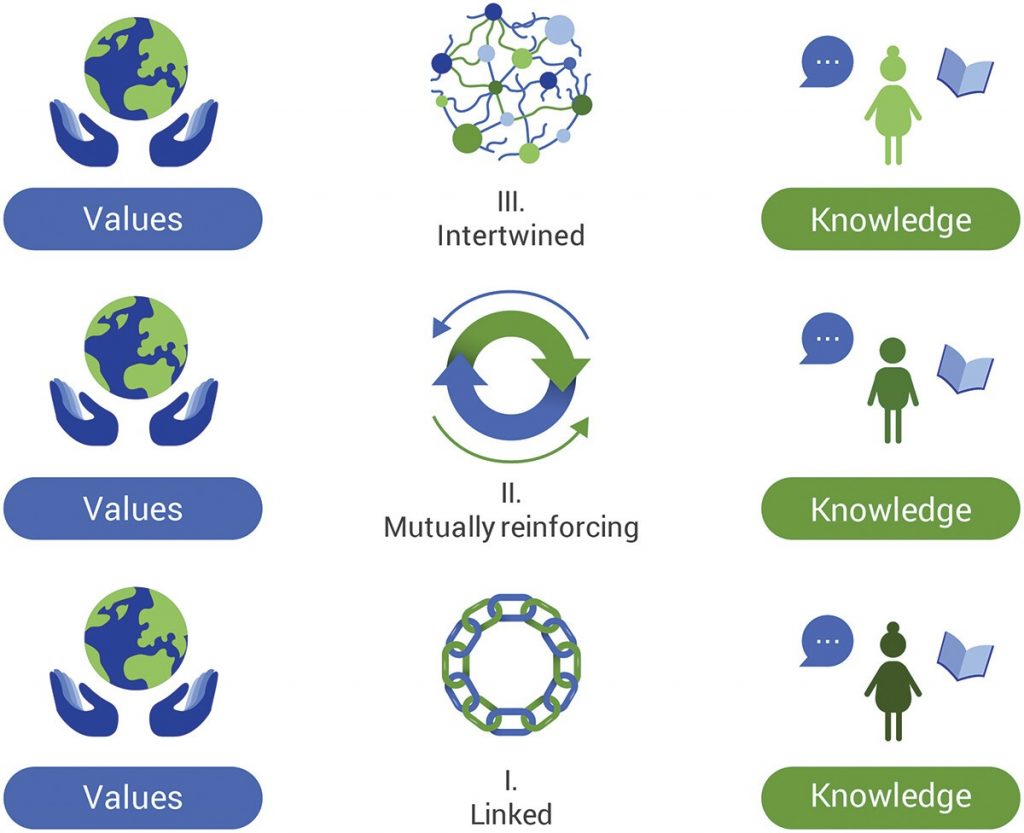by Andra Milcu
In conflict prone environments, such as multifunctional landscapes, where people with different stakes do not necessarily agree on how to manage their relationships with nature, it is challenging how participation in decision-making is organized to achieve better sustainable outcomes. The scholarship is currently divided into two strands: 1) the scientific advancement of concepts and frameworks for explaining how diverse knowledge systems inform more inclusive environmental decisions and 2) the advancement of diverse conceptualizations of values of nature to inform shared resource management futures. While both strands focus on embracing plurality, little theory has been developed for clarifying the interactions between values and knowledge in inclusive decision-making processes. In this context, we originally thought of our study as collecting individual baseline information on knowledge and values, and also as a way to prepare participants for future facilitated group interactions. In addition, our manuscript is drawing on the relational perspective in sustainability science to also explore the relationships between values and knowledge in the ‘controlled’ situation of envisioning ideal landscape visions. We collected information about the individuals’ core values, what values they assign to the landscape, their knowledge, and their visions for integrated landscape management. To prepare the individuals for future participatory settings we also asked about participants’ expectations of such settings, and encouraged reflexivity regarding their values and knowledge. We asked reflexive question about their values and the vision they created, about the knowledge they drew upon for creating the vision, and about how they see the relationship between own knowledge and values. The study unfolds three modalities in terms of how values and knowledge relate to form visions of nature: linked and not necessarily connected (modality I); mutually reinforcing (modality II); intertwined (modality III).

The paper aspires to contribute to the understanding and organisation of pluralistic and collaborative decision-making settings by acknowledging the importance of different forms of knowledge, as well as of different types of values. Recognising the interlinkages between values and knowledge may assist in creating more fair decision-making spaces. When striving for inclusive decision-making spaces, it is helpful to keep in mind that values and knowledge may be seen by participants as inseparable. Surfacing individuals’ values (including core ones) and knowledge prior to deliberation may lead to more inclusive decision-making settings, by balancing the representability of different value orientations or knowledge systems. We also found out that in the view of participants, consensus should not be the sole end point of collaboration and it is important to build social spaces for addressing differences and tensions in constructive ways. Based on participants’ feedback, reflecting on one’s knowledge and values, including one’s core values, although difficult, increases the depth of decisions.
Bio: Andra-Ioana Horcea-Milcu is a sustainability scientist and thinker. With a background in exploring social-ecological systems and experience in place-based transdisciplinary research, she is interested in leveraging the potential of knowledge co-creation to co-generate change in real-world contexts. Within this process, her main focus is on the role of core human values as leverage points for sustainability transformation. Through her boundary work, she aspires to contribute to managing the science|society interface, and to reframing sustainability in terms of core human values and empathetic relationships. Andra completed a PhD at Leuphana University of Lueneburg, and a postdoc at Helsus, the Helsinki Institute of Sustainability Science. Andra is a lead author for the Intergovernmental Science-Policy Platform on Biodiversity and Ecosystem Services (IPBES) values assessment and transformative change assessment.